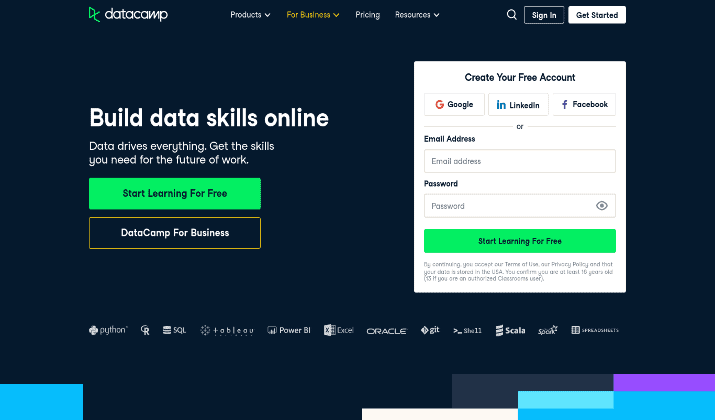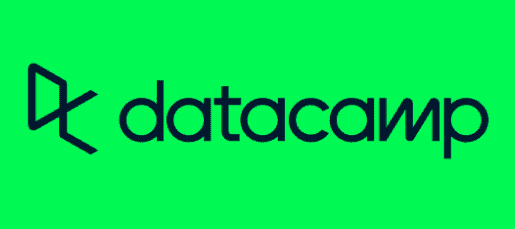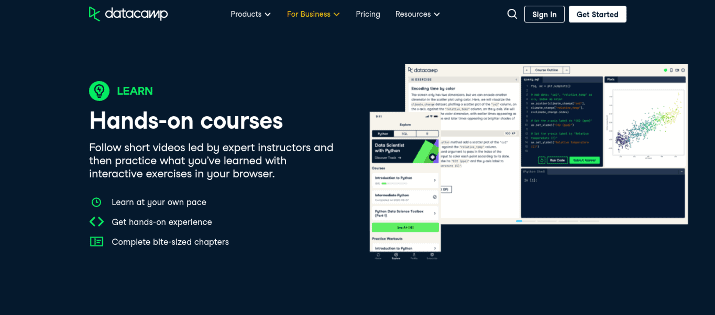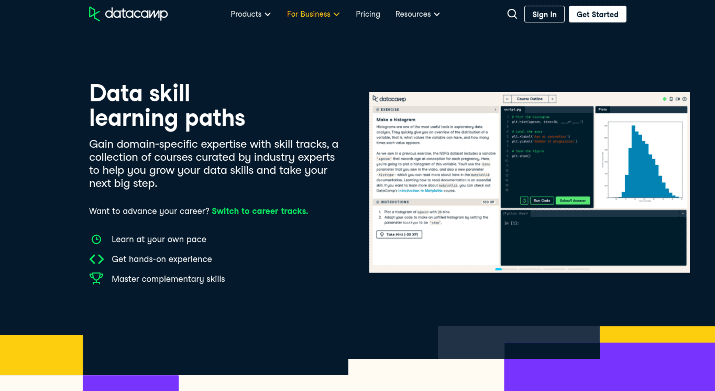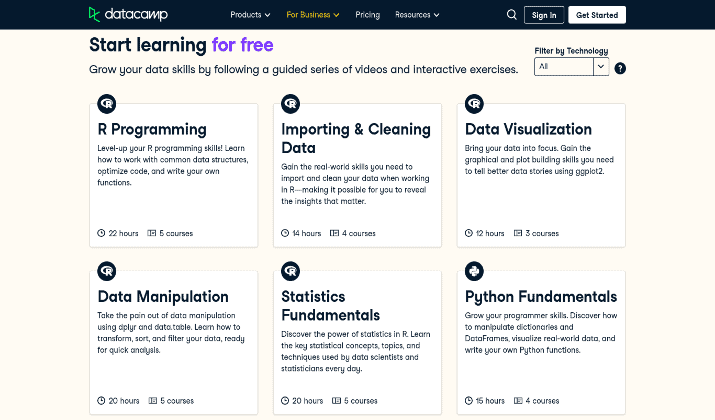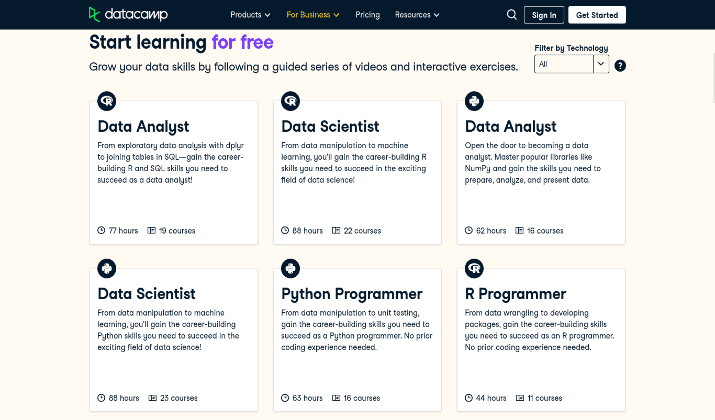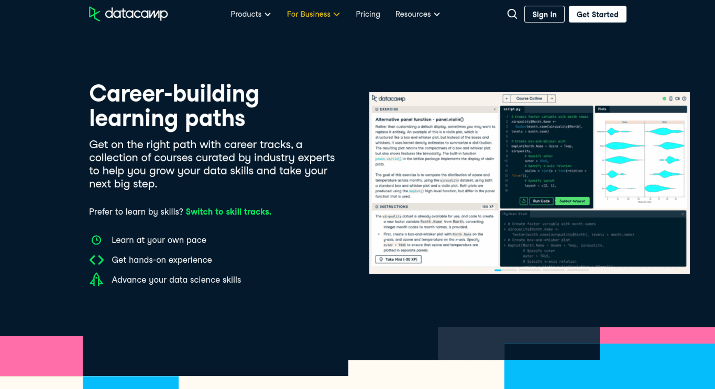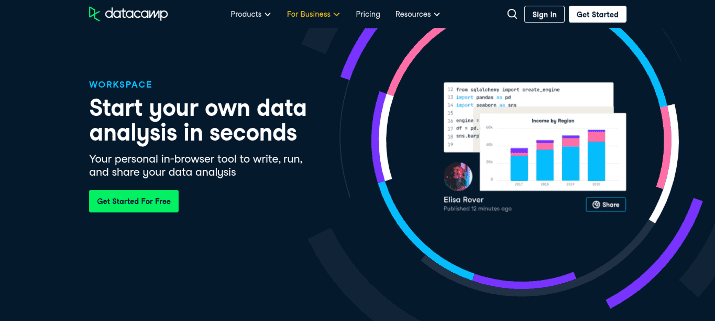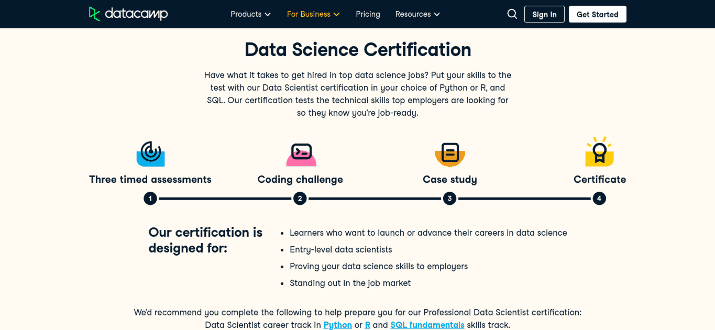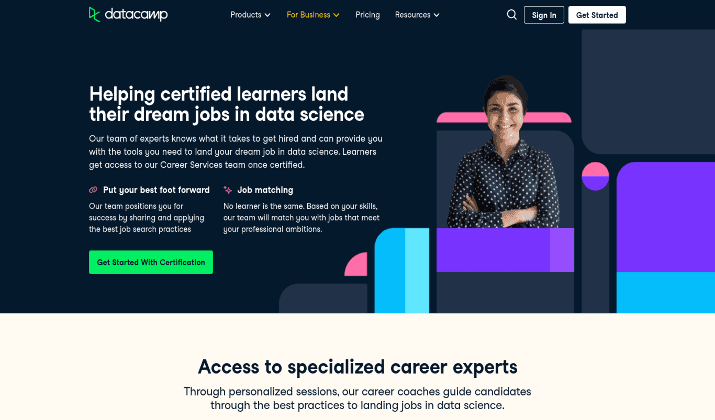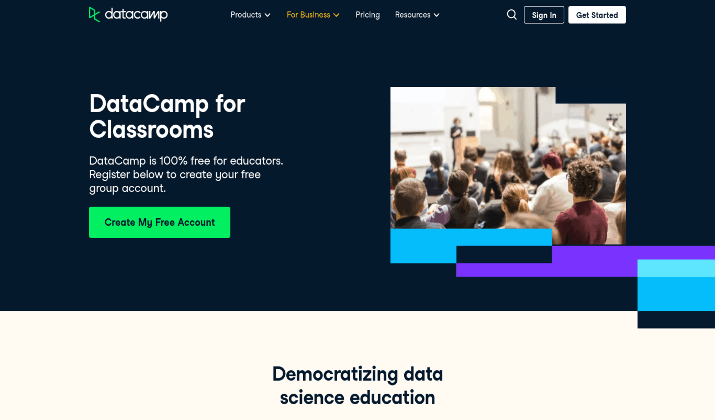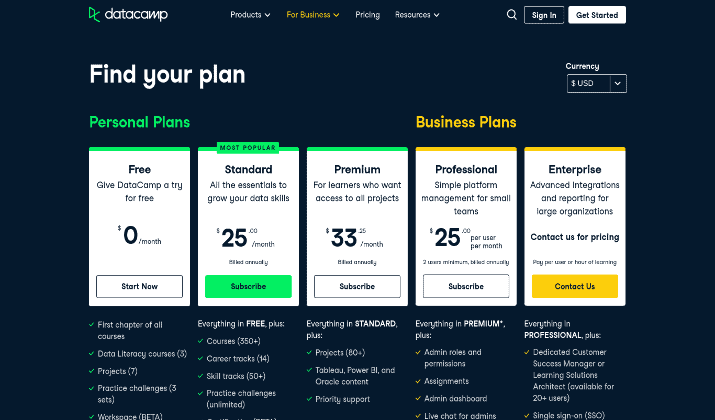Knowing how to code is an important skill that can increase your job opportunities, make you more attractive to employers, and allow you to set up your own online business.
Fortunately, you don’t need to attend college to learn how to code — there are a number of online training resources that teach programming and coding.
One of those is DataCamp, an online learning center for learning data science, Python, R, and other programming languages.
However, is DataCamp really worth it? Let’s take a closer look at what DataCamp has to offer, its prices, and whether it is worth it.
I’ll also mention some DataCamp alternatives that may interest you.
Let’s get into it!
What Is DataCamp?
DataCamp is an online platform where you can learn data science topics and languages such as R, Python, SQL, Power BI, and many more. It isn’t free, for the most part.
However, you can try out the first lesson of each course for free to get a taste of what the platform has to offer and to see whether you’d benefit from using DataCamp.
In addition to the courses, there are DataCamp Projects, which allow you to get real-world practice and develop the skills you learned during the courses. However, to access the Projects, you will need to upgrade to a more expensive plan.
Whether you're a business or a professional, DataCamp helps you grow by sharpening your data skills. Its carefully designed video tutorials, real-life projects, and assessments make learning easier & faster. Try it today!
You can get a certification from DataCamp for completing courses and going through an assessment process. While there is no guarantee that it will help you land a job, some recruiters may appreciate the fact that you took the time to learn new skills and develop them.
Let’s talk more about DataCamp’s courses and other features.
DataCamp Courses: What Can You Learn?
DataCamp’s courses cover a wide range of data science areas. For example, you can learn about:
- Data manipulation
- Data visualization
- Machine learning
- Probability and statistics
- Data engineering
- Applied finance
- Programming
- And a lot more!
There are over 350 courses available on DataCamp, allowing you to enrich your knowledge in a wide range of topics.
In addition, there are over 270 instructors on the platform, all of whom are experts in their respective fields. Some have jobs related to data science at companies like Nike or teach at prestigious universities, while others teach only at DataCamp.
Regardless, all the instructors are knowledgeable and good teachers.
Keep in mind that courses are not usually that long. For example, the Introduction to R course only lasts around four hours and has six chapters altogether.
Nevertheless, it provides you with a solid introduction to the R programming language. In addition, it contains over 60 exercises to help you practice your newfound R programming skills.
Skill And Career Tracks: Achieve Defined Goals
One of the problems of DataCamp is that it can be a bit overwhelming to beginners. After all, there are hundreds of courses to choose from, and it can be hard to know which ones are right for you and in which order to complete them.
To help you avoid this type of confusion, DataCamp has set up skill and career tracks. These tracks include several courses that were selected to help you achieve specific goals and help you gain specific skills or advance your career in a specific field.
There are more skill tracks than career tracks. While you have over 50 skill tracks to choose from, there are only 12 career tracks currently available.
The skills tracks don’t necessarily focus on a single specific skill. Instead, they may include skills that are related to or complement each other.
The R programming skill track, for example, starts off with the basics of R and then moves on to writing R code and functions in R. Later, you move on to object-oriented programming.
Once you complete all the courses in a track, you will get a statement of accomplishment that you can show to potential employers or recruiters or just put on your resume. The entire Introduction to R skill track lasts around 22 hours, which is not that long.
Career tracks are a little different. They are a bit broader; they contain more course content and require a lot more hours of learning.
Whether you're a business or a professional, DataCamp helps you grow by sharpening your data skills. Its carefully designed video tutorials, real-life projects, and assessments make learning easier & faster. Try it today!
Career tracks are there to help you prepare for a specific career. Here are some of the career tracks currently available:
- Data analyst
- Data scientist
- Python programmer
- R programmer
- Quantitative analyst
- Statistician
- Machine learning scientist
- Data engineer
There may be more than one career path for a specific career. For example, there are three tracks for “data analyst,” with each path containing different courses and lasting a different number of hours.
The Data Scientist with Python track includes 23 courses and takes 88 hours to complete. It includes interactive exercises where you get to practice your Python skills.
Are DataCamp Courses Worth It?
DataCamp courses are excellent for beginners. They give you solid introductions into complex topics such as Python, R, and SQL.
However, the actual quality does vary by course. Some courses are more in-depth than others — if you aren’t a beginner, you may not find some courses useful.
Therefore, I would recommend following the tracks, preferably the career tracks, as they will help you gain a wealth of knowledge in a specific area. Whether you are new to data science or want to study a new area you don’t have a lot of expertise in, the skills and career tracks are perfect for getting you started.
To be fair, some courses are more shallow, especially the introduction courses. However, one of the benefits of DataCamp is that it covers a wide range of topics.
Even if you are knowledgeable in one area of data science, you may find it useful because it allows you to learn a lot of other topics you didn’t study in college.
That’s why the career tracks and skill tracks are so useful. The career tracks, in particular, help fill you in on any skills you are missing in a particular field, so you are more well-rounded and better prepared to do a great job and impress any future employer.
Are DataCamp Exercises Any Good? What Are Projects?
One of the top complaints about DataCamp is that its exercises tend to be more of a fill-in-the-blank kind. In other words, they give you a large block of code and ask you to fill in a specific field, based on what you learned.
While that is great in helping you practice very specific skills you just learned about, it doesn’t give you a real chance to practice your skills in a real-world environment.
Now, that does vary by course, and the further on you get in a course, the more DIY the exercises become.
Whether you're a business or a professional, DataCamp helps you grow by sharpening your data skills. Its carefully designed video tutorials, real-life projects, and assessments make learning easier & faster. Try it today!
You may start off with entire blocks of code with just a few fields for you to fill in. However, once you get to the end of that course, you may find that the exercises give you a blank slate to code from scratch in.
In any case, DataCamp now has something that it calls Projects, which might be a solution to this problem. DataCamp’s Projects aim to help you achieve three things:
- Learn to code by yourself, from scratch
- Gain real-world experience
- Build a portfolio of projects you have created by yourself
There is a nice selection of projects — around 100 projects are available, in different areas, focusing on different skill sets. All of them focus on real-world projects, so you can get real experience to add to your portfolio, even if you never worked on a project before DataCamp.
The projects use Jupyter notebooks (that is an open-source web application, not an actual computer.)
Let’s take a look at one of these projects and see what it entails. This particular project uses R for data visualization and focuses on how the Covid-19 pandemic started out on a small scale and soon grew into a worldwide pandemic.
You will need to know skills such as manipulating data frames using dplyr. If you don’t know the skills needed for a particular project, feel free to study more DataCamp courses and come back to the projects later.
Workspace: Practice Data Analysis
Another way to practice your skills is to use Workspace, DataCamp’s in-browser tool for running data analysis with Python and R. While those are the only two languages currently supported, support for SQL is in the works as well.
You don’t need your own data, either. You can use one of the data templates provided by DataCamp to get started right away.
If you do have your own data, simply import it and run your analysis. Once you have done so, you can publish and share your analysis, so your colleagues can see it.
You can even share it with recruiters to show them your skills.
Will DataCamp Help You With Your Job Search?
That’s not an easy question to answer. It’s likely that DataCamp will help you in your job search, but it does depend on a lot of things, such as:
- The specific recruiter you are dealing with
- The job you are applying for
- The amount of work you have put into DataCamp
Some recruiters, for example, won’t be particularly impressed that you completed a course on DataCamp. However, there’s a lot more you can do on DataCamp than simply completing a course.
For example, you can complete an entire career track, which is a lot more impressive than completing a single course, as you have to put in a lot more hours and complete more exercises.
The Projects are also great, as they show you have real-world experience in the skill you studied. In addition, you can show off your results in the Projects and in the Workspace as a reference for employers to see what skills you really have.
Let’s go over some additional ways DataCamp may be useful in your job search.
DataCamp Certification
DataCamp provides full-on certification in Data Science in R or Python & SQL. This certification shows that you are knowledgeable in skills such as data management, exploratory analysis, model development, statistical experimentation, and more.
To create the certification process, DataCamp looked at job posts on job boards to see what recruiters were looking for in potential employees, including the skills they wanted their employees to have.
Whether you're a business or a professional, DataCamp helps you grow by sharpening your data skills. Its carefully designed video tutorials, real-life projects, and assessments make learning easier & faster. Try it today!
In addition, DataCamp conducted interviews with professional data scientists to figure out which tasks were more critical to a role, so they could focus on those tasks in their certification assessments.
So, what exactly does a certification entail? Here are the three main steps you need to go through to get certified as a data science by DataCamp:
- Three timed assessments: You need to answer questions about a specific skill set and reach a certain threshold of knowledge to proceed. Each quiz is timed.
- A coding assessment: This assessment takes longer than the quizzes. You will be provided with a scenario, data, and a question, and you will need to answer that question and figure out exactly what you need to do in the scenario, based on the data you have. It will test your coding skills.
- A case study: Finally, you will have to create and complete your own case study. This step has two parts: There is a technical report and a non-technical presentation. There will be data provided; you will have to select data sets, formulate a problem statement, and solve that problem.
So, is it worth getting a DataCamp certification, and what do employers think about it?
I’d say that if you are just starting out in the data science field, and you don’t have any work experience to show on your resume — and especially if you don’t have any official degree in data science — this certification may be worth it.
It can help add some credibility to your resume and stand out from other applicants, provided you are applying for an entry-level job that doesn’t have that much competition from more experienced data scientists.
However, if you are applying for a more advanced-level position, employers might not be too impressed with a certification from DataCamp. After all, it’s not an official certification of any sort, and many employers will be unfamiliar with DataCamp and the process it uses to determine candidates’ eligibility for certification.
Career Coaching
DataCamp’s career coaching services may help you find a job. The coaching services start out with job planning — the team will help you identify your strong areas and define your job goals, so you can start working on a plan for landing the job of your dreams.
Then, they will move on to your resume and online profiles. Your LinkedIn profile will be important for finding a good job, which is why the team will review and optimize your LinkedIn profile, along with your resume and portfolio, to increase your chances of being hired.
Finally, they help you find jobs through job matching and networking events. Networking sessions take place for certified data scientists (who are certified by DataCamp, of course) to help them get in touch with potential employers.
There are also workshops that will help you learn how to network, improve your interviewing skills, and find new job opportunities. To help you prepare for interviews, there is a mock interview, where you can practice being interviewed — that can help make you less nervous as well.
Right now, DataCamp is holding a summer certification challenge. What this means is that if you get certified by September 30th, you will get a coaching package, containing all the above services, for free!
Normally, that would cost you $400.
DataCamp For Your Business: Training Employees
DataCamp also offers a solution to companies, agencies, and businesses who want to teach essential data science skills to their employees. DataCamp for Business allows companies to give their employees access to DataCamp courses and exercises.
However, you aren’t stuck with the regular DataCamp courses. If you want to offer your employees a course that is more specific to your business, you can set up a custom course.
According to DataCamp, custom courses have a completion rate that is double, on average, that of regular courses.
If you are an agency looking for new talent, you can attend one of the networking sessions DataCamp holds. I talked about those networking sessions above, and I mentioned that they give data scientists an opportunity to connect with potential employers.
However, these sessions also give employers an opportunity to connect with new talent. Recruiters can attend those sessions to get to know budding data scientists — all the data scientists attending the sessions are certified by DataCamp.
Use DataCamp To Teach Your Students
Educators, including high school teachers, can use DataCamp to provide their students with data science courses on a wide range of topics. One of the cool things about this is that it is entirely free for educators — you won’t have to pay a dime.
As a teacher, you can assign different courses or skill tracks to different students, create assignments, track your students’ progress, and use the leaderboard to see where your students are holding. It will cost nothing, and you will get a chance to impart valuable skills to your students that may improve their lives.
Whether you're a business or a professional, DataCamp helps you grow by sharpening your data skills. Its carefully designed video tutorials, real-life projects, and assessments make learning easier & faster. Try it today!
DataCamp: Pros And Cons
Pros
- It covers a wide range of topics.
- It has real-world projects to work on.
- The browser Workspace tool is cool and can help you share your expertise with friends or recruiters.
- It is free for educators.
- You can get certified, which is great for new data scientists.
- Career coaching services can help you land a job.
- One monthly subscription gives you access to all the courses for free.
Cons
- It is not really free (only the first chapter of each course is, and only three courses are available for free in full).
- Many of the exercises are fill-in-the-blank, which doesn’t really allow you to develop your skills.
- The data coaching services can be expensive.
- You need to pay extra to access the Projects.
DataCamp: Pricing
DataCamp has five pricing options. Let’s go through them here.
- Free: The free plan gives you access to three basic courses on data engineering, data science, and machine learning. You get access to seven projects and three practice challenge sets. The first chapter of every course is also free.
- Standard — $25/month: You get access to all courses, tracks, and challenges, but not projects.
- Premium — $33/month: This plan gives you access to projects and additional premium content.
- Professional — $25/month per user: This plan is for agencies and teams.
- Enterprise: This is a custom plan for enterprise users and comes with perks such as a dedicated manager and LMS integration.
These prices apply when paying annually; if you pay monthly, it will cost more. Always check the pricing page for updated information.
Whether you're a business or a professional, DataCamp helps you grow by sharpening your data skills. Its carefully designed video tutorials, real-life projects, and assessments make learning easier & faster. Try it today!
Alternatives To DataCamp
While DataCamp is a solid option, it is far from the only place to learn how to code online. Here are the top alternatives to DataCamp:
- freeCodeCamp: This website is entirely free to use. It teaches you how to code and program in many languages, and it offers certification in areas such as information security, data analysis, scientific computing with python, and many others.
- Udemy: Udemy doesn’t focus exclusively on data science, but it offers courses from private instruction in many areas. You can find many cheap courses on data science, but you have to purchase each course separately instead of paying for a monthly subscription.
- Codecademy: Codecademy offers longer skill paths and courses that sometimes cover more depth.
Wrapping It Up: Is DataCamp Worth It?
Yes, DataCamp is worth a try, especially if you are just starting out with data science and want a reliable platform where you can learn many topics in a simple, easy-to-understand learning style.
I recommend signing up for a monthly plan first. That way, you get a whole month to decide whether the platform is for you instead of committing to a yearly subscription, which can be costly.

Benjamin Levin is a digital marketing professional with 4+ years of experience with inbound and outbound marketing. He helps small businesses reach their content creation, social media marketing, email marketing, and paid advertising goals. His hobbies include reading and traveling.
